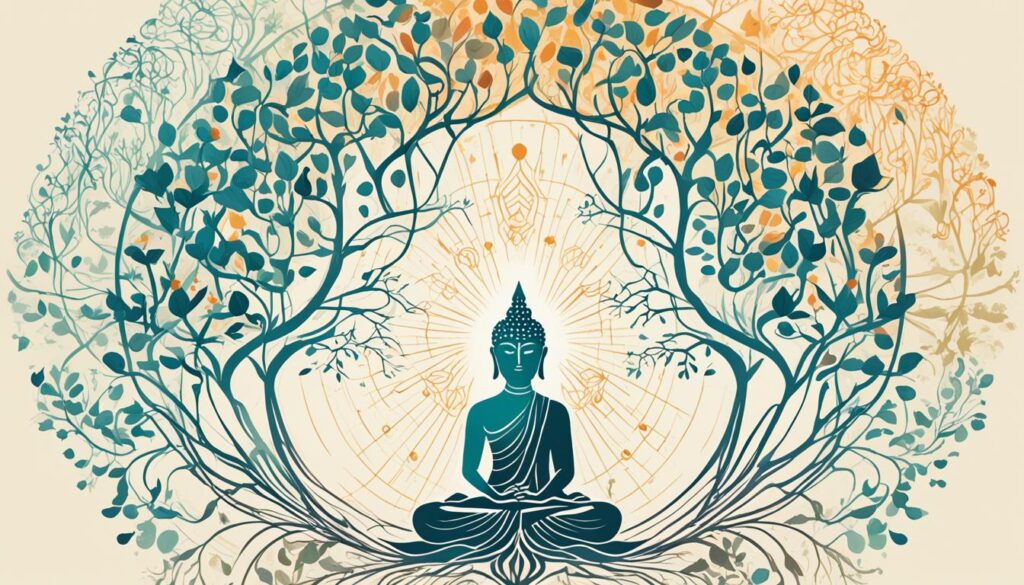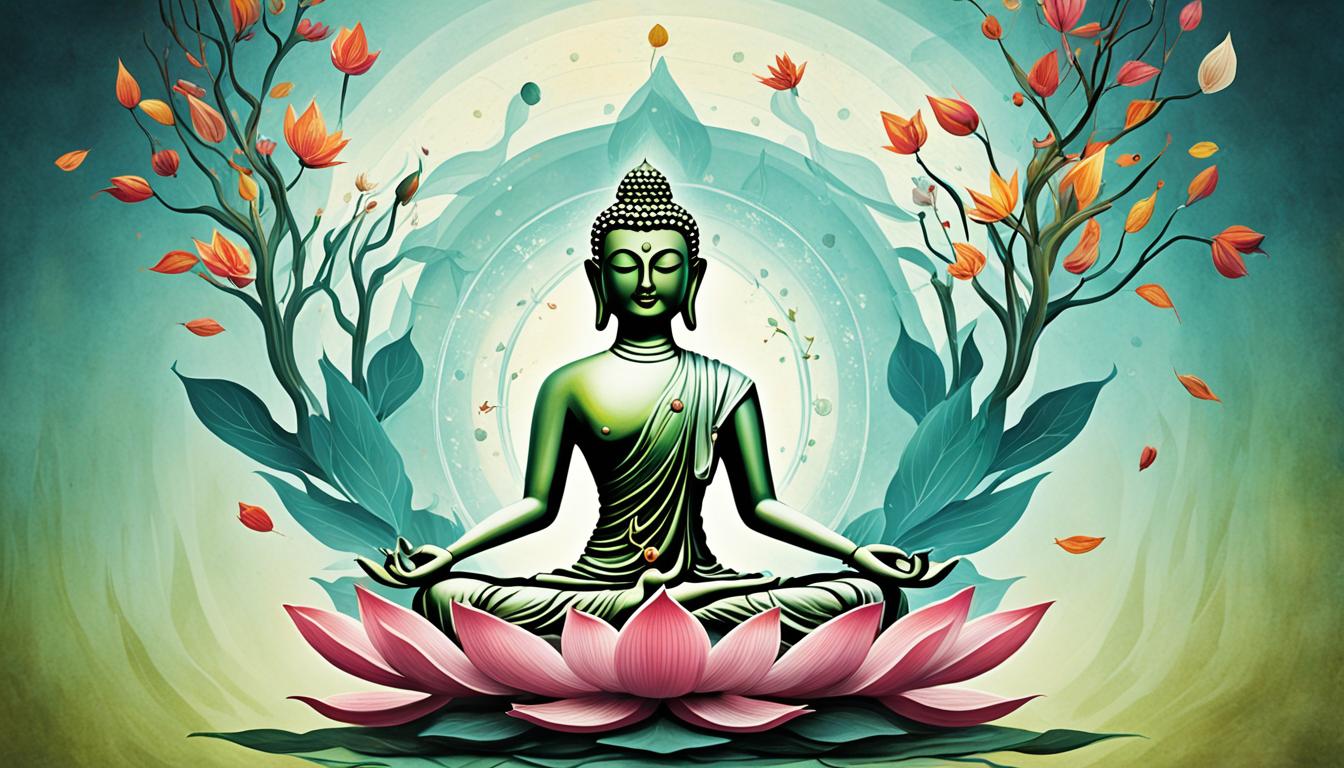“Peace comes from within. Do not seek it without.” – Buddha
Buddhism, with its rich history and profound teachings, offers powerful insights into the nature of existence and the path to enlightenment. The main beliefs in Buddhism revolve around the wisdom of Siddhartha Gautama, known as the Buddha. These beliefs, rooted in deep contemplation and spiritual growth, can guide you on a transformative journey towards inner peace and liberation.
Explore the core tenets of Buddhism and discover how they can enhance your understanding of suffering, impermanence, and the interconnectedness of all beings. By embracing these beliefs, you can find profound meaning in the midst of life’s challenges and cultivate a sense of harmony within yourself and with the world around you.
Embark on this journey of self-discovery and discover the transformative power of the main beliefs in Buddhism.
Key Takeaways:
- The main beliefs in Buddhism are centered around the teachings of Siddhartha Gautama, also known as the Buddha.
- The Four Noble Truths are fundamental to Buddhist philosophy, addressing the nature of suffering and its causes, as well as the path to its end.
- Impermanence is a key belief in Buddhism, recognizing the constant change and transience of all phenomena.
- The concept of no-self teaches the interconnectedness of all beings and emphasizes compassion and empathy.
- Embracing the main beliefs in Buddhism can lead to inner peace, wisdom, and a greater sense of compassion.
The Four Noble Truths: Understanding Suffering and Liberation
The Four Noble Truths form the foundation of Buddhist philosophy. They are the truth of suffering, the truth of the cause of suffering, the truth of the end of suffering, and the truth of the path that leads to the end of suffering. These truths emphasize the acknowledgment of suffering, the identification of its causes as craving and attachment, the possibility of liberation from suffering, and the Noble Eightfold Path as the means to attain liberation. By understanding and embodying these truths, individuals can navigate the challenges of life and find lasting happiness.

| Four Noble Truths | Description |
|---|---|
| Truth of Suffering | Life is inherently filled with suffering and dissatisfaction. |
| Truth of the Cause of Suffering | Craving and attachment are the fundamental causes of suffering. |
| Truth of the End of Suffering | The cessation of craving leads to the end of suffering. |
| Truth of the Path that Leads to the End of Suffering | The Noble Eightfold Path is the way to achieve liberation from suffering. |
Impermanence: Embracing the Transient Nature of Existence
Impermanence, or Anicca, is a fundamental belief in Buddhism that teaches the transient nature of all phenomena. This key belief in Buddhism recognizes that everything in this world is constantly changing and that nothing possesses a permanent, unchanging essence.
By contemplating impermanence, individuals can gain a deeper understanding of the impermanent nature of their own experiences and emotions. This contemplation allows us to reduce attachment to the transient and cultivate acceptance of the ever-changing nature of life.
Like the petals of a blooming flower or the waves of the ocean, impermanence reminds us that everything in life is in a continuous state of transformation. It encourages us to shift our perspective and fully embrace the present moment, cherishing the beauty and joy that arises in each passing experience.
When we recognize the impermanence of all things, we free ourselves from the illusion of permanence. This awareness liberates us from clinging to what is fleeting, allowing us to find a deeper sense of peace and contentment within ourselves.

| Key Insights on Impermanence | Benefits of Embracing Impermanence |
|---|---|
|
|
No-Self: Understanding Interconnectedness and Compassion
In Buddhism, the concept of no-self, or Anatta, challenges our conventional understanding of personal identity. It highlights the central belief that there is no fixed, enduring self-entity within individuals. Instead, Buddhism teaches that our sense of self is impermanent and constantly changing, arising from a complex interplay of causes and conditions.
This profound understanding of no-self has significant implications for our daily lives. By recognizing the absence of a permanent, independent self, we begin to appreciate the interconnectedness of all beings. We understand that our experiences are not separate from the experiences of others. This realization fosters a deep sense of compassion, empathy, and interconnectedness with all sentient beings.
Embracing Interconnectedness
When we embrace the belief in no-self, we let go of our egoic attachments and personal desires. We understand that our suffering is not unique or isolated, but rather a shared human experience. This recognition cultivates empathy, as we empathize with the struggles and challenges faced by others.
By embracing interconnectedness, we dissolve the barriers that separate us from others. We begin to appreciate the intrinsic worth and value of every individual, treating them with kindness and respect. This shift in perspective widens our circle of compassion, extending it to encompass not only our loved ones but also strangers and even those we may perceive as adversaries.
Acts of Kindness and Understanding
As we deepen our understanding of interconnectedness, acts of kindness and understanding naturally arise. When we recognize the impermanence of our own self, we become less attached to our own desires and more open to the needs and well-being of others.
Compassion compelled by the belief in no-self motivates us to alleviate the suffering of others. We actively seek opportunities to extend a helping hand, practicing acts of kindness, generosity, and empathy. Through these actions, we create a world that is more inclusive, harmonious, and compassionate.
A Table on the Belief of No-Self in Buddhism:
| Belief | Description |
|---|---|
| No-Self (Anatta) | There is no permanent, independent self-entity within individuals. |
| Interconnectedness | All beings are interconnected, and our experiences are not separate from those of others. |
| Compassion | The belief in no-self fosters compassion, empathy, and understanding towards all sentient beings. |
| Acts of Kindness | Embracing no-self inspires acts of kindness, generosity, and empathy towards others. |
By cultivating an understanding of no-self, we deepen our connection with ourselves and the world around us. We break free from the confines of ego and embrace the interconnectedness of all beings. This belief in no-self not only brings us closer to inner harmony but also creates a more compassionate and inclusive society.

Conclusion: Embracing the Three Main Beliefs of Buddhism
The main beliefs in Buddhism, including the Four Noble Truths, impermanence, and no-self, offer profound insights into the nature of existence and the path to liberation. These beliefs provide a framework for understanding suffering, cultivating mindfulness, and experiencing interconnectedness.
By embracing these beliefs and incorporating them into your daily life, you can find greater peace, wisdom, and compassion. The central beliefs in Buddhism are not just philosophical concepts; they are practical teachings that can transform your perspective and guide you towards a more fulfilling and enlightened existence.
Despite being thousands of years old, the key beliefs in Buddhism remain relevant in today’s rapidly changing world. In a society that values material possessions and external achievements, these beliefs serve as a reminder of the importance of inner growth, self-awareness, and empathy towards others.
Embarking on a spiritual journey towards inner peace and enlightenment begins with understanding and embracing the main beliefs in Buddhism. By integrating the Four Noble Truths, impermanence, and no-self into your life, you can cultivate a deep sense of mindfulness, compassion, and connectedness with the world around you. These beliefs offer a timeless path to personal and societal harmony, guiding you towards a life of purpose and fulfillment.
FAQ
What are the main beliefs in Buddhism?
The main beliefs in Buddhism are centered around the teachings of Siddhartha Gautama, also known as the Buddha. These beliefs include the Four Noble Truths, the concept of impermanence, and the doctrine of no-self.
What are the Four Noble Truths?
The Four Noble Truths form the foundation of Buddhist philosophy. They are the truth of suffering, the truth of the cause of suffering, the truth of the end of suffering, and the truth of the path that leads to the end of suffering.
What is impermanence in Buddhism?
Impermanence, or Anicca, is a fundamental belief in Buddhism that teaches the transient nature of all phenomena. It emphasizes that everything is constantly changing and nothing possesses a permanent, unchanging essence.
What is the doctrine of no-self in Buddhism?
The doctrine of no-self, or Anatta, challenges the concept of a fixed, independent self. Buddhism teaches that there is no enduring self-entity within individuals and emphasizes the interconnectedness of all beings.
How do these beliefs guide individuals on a spiritual journey?
Understanding and embracing the main beliefs in Buddhism can guide individuals on a spiritual journey towards inner peace and enlightenment. These beliefs provide insights into the nature of suffering, impermanence, and interconnectedness, offering a framework for cultivating mindfulness, wisdom, and compassion.

